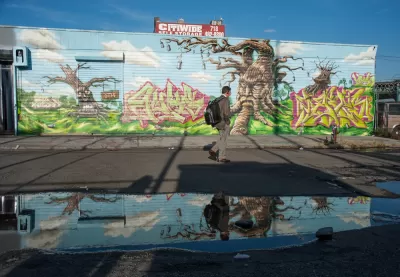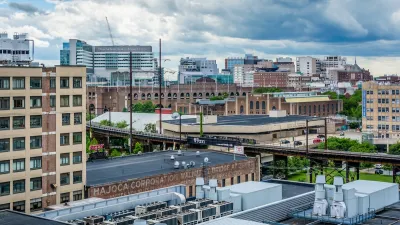Let the debate ensue about the accuracy (not to mention the appropriateness) of the "Gentrifier Calculator" exercise.

"Have you ever found yourself eating a maple bacon donut on a Citi Bike en route to Whole Foods after an exhausting yoga session and wondering: Am I a gentrifier?"
So begins a possibly, somewhat tongue-in-cheek article by Chris Kirk for Slate that promotes a "Gentrifier Calculator." According to Kirk's definition, "Gentrifiers are people with medium or high incomes moving into low-income neighborhoods, attracting new business but raising rents, and often contributing to tensions between new and long-term residents."
The calculator, which runs the numbers on your (yes, you) income compared to median income for your zip code and the median income of your metropolitan area. While it calculates, the screen ponders, "Opening a wine bar," "chasing a taco truck," and "having brunch."
On a more serious note, the post notes that there is no universally accepted definition of gentrification, but called on Ingrid Gould Ellen, a professor of public policy and urban planning at New York University, in finding the formula for the calculator. "For the purposes of this calculator," explains Kirk, "Ellen suggested this formula: If your neighborhood’s median income is lower than the median income of your city, and your income is higher than your city’s median, you’re a gentrifier."
FULL STORY: Are You a Gentrifier?

Manufactured Crisis: Losing the Nation’s Largest Source of Unsubsidized Affordable Housing
Manufactured housing communities have long been an affordable housing option for millions of people living in the U.S., but that affordability is disappearing rapidly. How did we get here?

Americans May Be Stuck — But Why?
Americans are moving a lot less than they once did, and that is a problem. While Yoni Applebaum, in his highly-publicized article Stuck, gets the reasons badly wrong, it's still important to ask: why are we moving so much less than before?

Using Old Oil and Gas Wells for Green Energy Storage
Penn State researchers have found that repurposing abandoned oil and gas wells for geothermal-assisted compressed-air energy storage can boost efficiency, reduce environmental risks, and support clean energy and job transitions.

Minneapolis Bans Rent-Setting Software
Four cities have enacted restrictions on algorithmic software that can inflate rent costs.

Oakland to Add 244 New EV Chargers
Oakland plans to launch its new charging network at eight locations by the end of 2025.

Jane Goodall Inspires with Message of Hope, Resilience, and Environmental Action
Speaking in Pasadena, Jane Goodall offered a hopeful and inspirational message, urging global compassion, environmental responsibility, and the power of individual action to shape a better future.
Urban Design for Planners 1: Software Tools
This six-course series explores essential urban design concepts using open source software and equips planners with the tools they need to participate fully in the urban design process.
Planning for Universal Design
Learn the tools for implementing Universal Design in planning regulations.
Heyer Gruel & Associates PA
City of Moreno Valley
Institute for Housing and Urban Development Studies (IHS)
City of Grandview
Harvard GSD Executive Education
Salt Lake City
NYU Wagner Graduate School of Public Service
City of Cambridge, Maryland





























